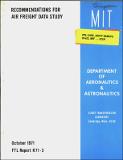| dc.description.abstract | Introduction: On January 15, 1971 the Department of Transportation and the Civil Aeronautics Board announced a joint research project in conjunction with the Department of Transportation's contractor, the Massachusetts Institute of Technology. The purpose of the project is the development of a domestic and international air freight traffic data base. Although both agencies recognize a continuing need for regularly reported statistics on air freight movements, their individual needs are not compatible. Furthermore, it was not obvious that the industry's needs would automatically be fulfilled even if these two agencies were to settle on a common set of data requirements. The first part of the study involved establishing the statistical needs of the DOT, CAB and the industry. Although the initial DOT requirements included the CAB needs, there remained the need to review the data desired by the industry. MIT, in conjunction with the DOT and CAB representatives, initially interviewed selected US air carriers and cargo data users to analyze the air freight data systems operations and determine whether the data requirements developed in the DOT/CAB specifications were in fact useful and practical from an industry point of view. Based on preliminary industry needs and DOT/CAB needs, MIT's task was to determine a feasible initial data specification in light of the information presently available from air bill sampling (or the information which might be reasonably expected on a new air bill). In case of conflicts, MIT was to recommend priorities. As required for completion of Phase I of the Air Freight Data Study, the following are our recommendations for the continuation into Phase II based on the informal survey of the data-gathering activities and capabilities of the industry and specific needs of the DOT and the CAB. Throughout February and March a survey of eleven airlines and three airframe manufacturers was made to determine the industry's data needs and ability to provide such data. The atmosphere throughout the attendant meetings was one of interest and cooperation with much constructive criticism. The airlines and manufacturers surveyed included: Allegheny Airlines, Inc., American Airlines, Inc., Continental Air Lines, Inc., Delta Air Lines, Inc., Eastern Air Lines, Inc., North Central Airlines, Inc., Northwest Airlines, Inc., Pan American World Airways, The Flying Tiger Line, Inc., Trans World Airlines, Inc., United Air Lines, Inc., The Boeing Company, McDonnell-Douglas Corporation, Lochkeed-California Company, Lockheed-Georgia Company. | en_US |
